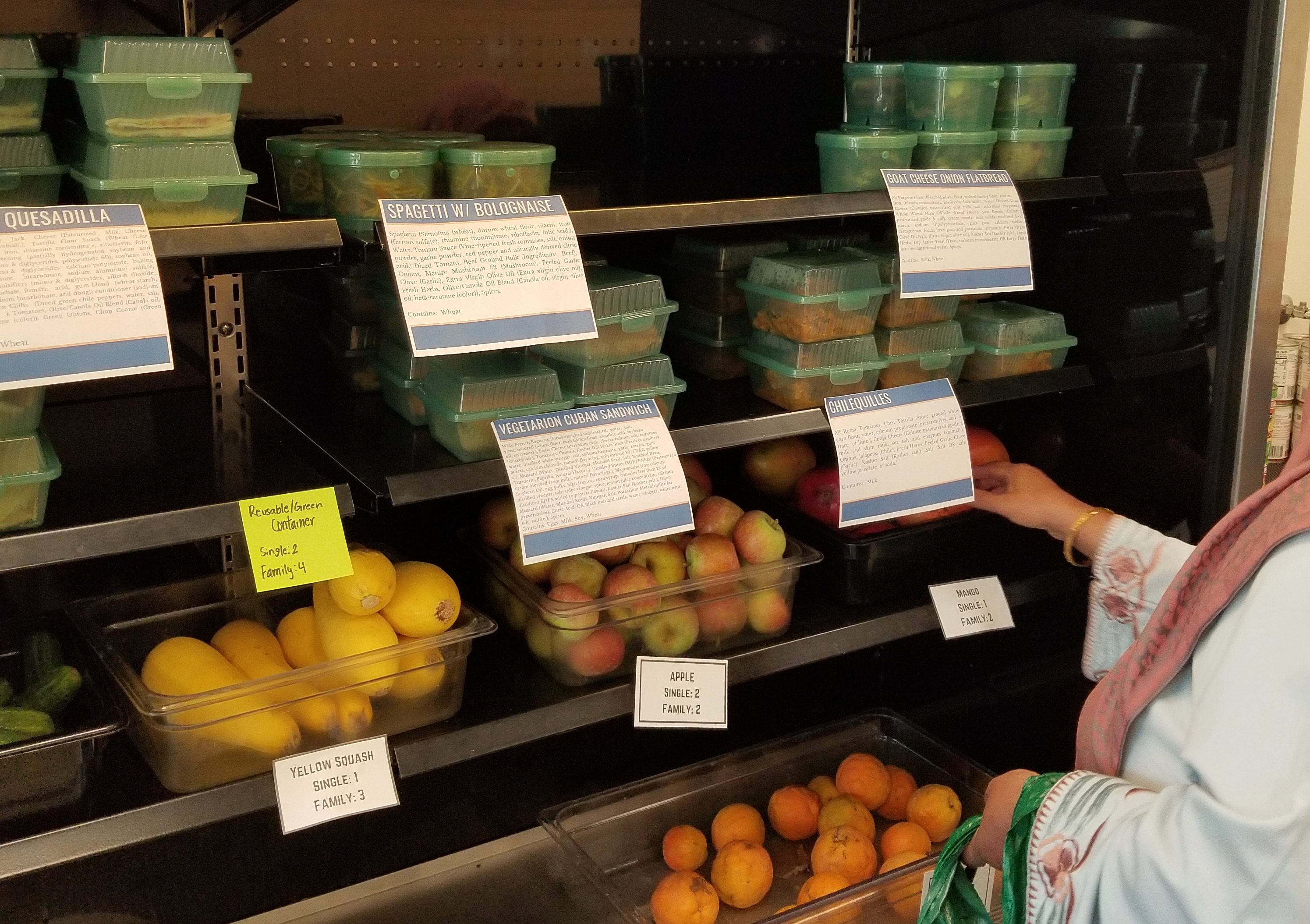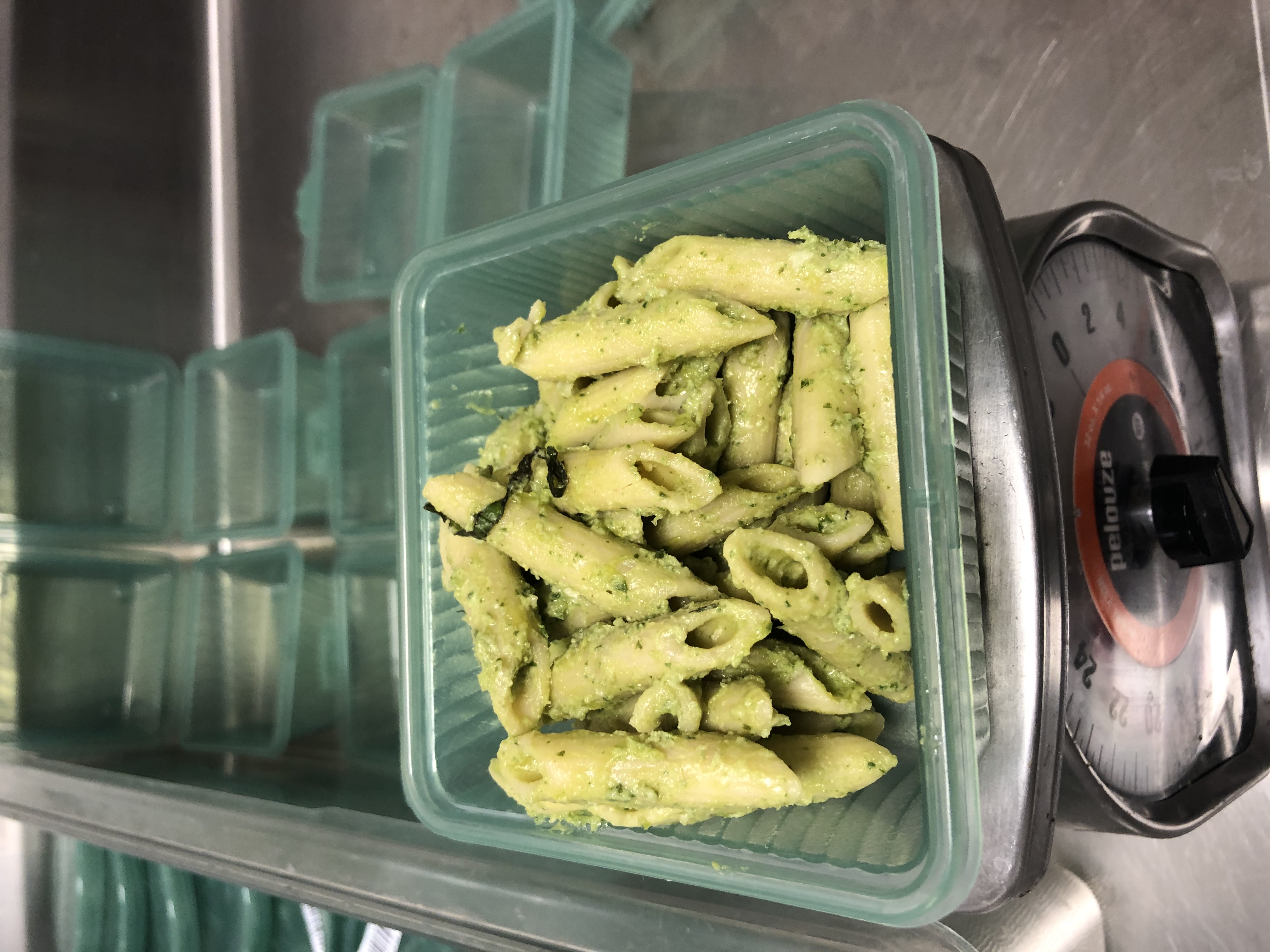HDAE’s Food Recovery Program

Continuing the Journey to Food Security & Sustainability at UCSB
What do you do when your nascent food pantry, during its first year of operation, successfully reaches over 800 students in need, with an average of 229 visits per week? If you are UCSB Campus Dining, you build on your success, expanding your program in a way that aims for progress toward dual goals of food security and sustainability. To be specific, you pilot a Food Recovery Program that redirects and packages surplus dining commons prepared foods in order to offer your pantry patrons fresh options that are nutritious and convenient. This is how you continue your journey toward leadership in attending to a complex problem, on our campus and beyond.
How did the journey begin? In October 2018, Miramar Food Pantry opened its doors to help address food insecurity at UCSB, and soon began feeding approximately 317 individuals per week. Fully funded by HDAE, the pantry, located at Sierra Madre Villages, offers free food items in a large open space with cold storage bins, making it possible to offer fresh produce. Food selections focus on healthy options and visitors can expect a variety of fresh fruits and vegetables including carrots, onions, celery, snap peas, strawberries, oranges, apples, grapefruit and more. Other options include staple items like canned foods, pasta, cereal, peanut butter, and beans. Registered undergraduate and graduate students fill out a self-declaration of income form on their first visit to the pantry each academic year. Students may visit the pantry every day it is open.
In the fall of 2019, Campus Dining took the next step and set its sight on food recovery, in order to continue efforts in addressing food insecurity, while also reducing its environmental impact. The program works toward both goals by utilizing food items that would otherwise be composted from Portola Dining Commons, providing them to patrons at the Miramar Food Pantry. Options include dishes such as cooked beans, rice, vegetables, soup, prepared entrees, and more. The program is designed to be convenient for students, as most items provided by Portola can simply be reheated and enjoyed. Additional considerations are made for health and nutrition with all food items offered, mirroring practices for the dining commons. In addition to the pantry’s original focus on food security, Campus Dining has added a second focal point of reducing food waste. In the United States, food waste is estimated at between 30-40 percent of the food supply. In 2015, the USDA joined with the U.S. Environmental Protection Agency to set a goal to cut our nation’s food waste by 50 percent by the year 2030, and the Food Recovery Program is part of the commitment Campus Dining has made to achieve that goal. The impact of reducing food waste is significant, not only in terms of food security, but also with regard to the environment, as all food diverted from compost results in reduced greenhouse gas emissions.
How does the program operate? One to two days in advance, Campus Dining managers identify specific food items from the Portola Dining Commons daily menu, items that have a strong potential for successful recovery. On the day the items are served, any leftovers are collected at the end of the meal period, cooled and delivered to the nearby Tenaya Market and Eatery. At Tenaya, the recovered items or entrees are packed into small reusable containers. Once packaged, the staff transports the product to Miramar for distribution. Patrons return the empty containers to the pantry at a future visit, for cleaning, sanitation and reuse. Eleven food recoveries have been completed during the 2019-2020 fiscal year, with more planned for the future.
The pilot phase of the program has only just begun, but Campus Dining has a plan for evaluating its success over time. A variety of data collection practices have been put in place in order to obtain program metrics, for example, tracking the number of containers taken each day, tracking the types of items selected (to determine what is most desirable to the population served), and measuring the amount of food recovered by weight. These practices supplement existing pantry tracking methods that have established our analytics baseline, such as the number of participants using the pantry, and the total number of people served each day the pantry is open. These metrics will allow Dining management to observe any increase in the number of students that are being supported, and make decisions that reduce waste and enhance offerings as the program continues.
One more notable element of this project: in developing the Food Recovery Program plan, Campus Dining sought a TGIF grant from the UCSB Sustainability Office to help defray startup costs. The grant was awarded, and Campus Dining was able to use the funds to purchase an electric vehicle, a refrigeration unit, reusable food containers and other required equipment for both food holding and transport, all of which helped establish the new program. The anticipation is that the program will continue for many years, and as it is further developed, food will be recovered from other dining locations, in addition to Portola.
In summary, Campus Dining is taking steps to prioritize actions to manage and reduce food waste; instead of sending uneaten food to be made into compost, food insecure students are being fed nutritious meals. By redirecting unspoiled food, Campus Dining continues to support social and environmental change in our community.


